According to Rebbe Nachman, Malkhut, the last Sephira in the Tree of Life diagram, is associated with holy eating
Malkhut is essentially the Shekhina who gives us our sustenance from the spiritual world of Atzilut. It is responsible for much of the judgment that happens and governs over the lower spiritual worlds of Beriyah, Yetzirah, and Assiyah. But, because of the breaking of the vessels, Malkhut requires a lot of work in order to be rectified and returned back to its spiritual source.
When Malkhut is rectified, all the spiritual worlds are blessed, have plenty of sustenance, and peace reigns. When Malkhut is lacking, however, many of the problems we see in the world happen because of it.
In this foundational class, we will learn how eating is as much a part of Avodat Hashem as any other prayer and Mitzvah and has lots of opportunities. Many Chassidic Rebbes, such as R’ Elimelech of Lizhensk in his Tzeitl Kattan, attest to the importance of eating with holiness. In fact, eating is one of the main challenges and measuring rods to where a person stands in Avodat Hashem.
From a Kabbalistic standpoint, if you have the proper Kavanah when you are eating (something kosher), you are in fact performing the following spiritual work:
- Drawing down sustenance to the higher partzufim
- Sifting and elevating the sparks from the food
- Rectifying the reincarnated souls in the food
- Sustaining your own soul with the light of the food
- Sweetening the Judgments
- Strengthening and bringing the Holy Malkhut down
From Etz Chaim, we know that the Light of Ein Sof vests itself in Adam Kadmon and from there it goes down to the Sephirot of Atzilut and the other spiritual worlds. (To be more precise, the light of Ein Sof vests itself up until Chokhmah of Atzilut, but that is not our focus now)
If we have the Kavanah of eating, we can increase the flow of light that comes to these spiritual worlds and Sephirot down us. After all, this is the purpose of bringing down light: so the lower realms can also receive them and be elevated.
There are 3 main systems of Kavanot that the Arizal mentioned in the Kitvei Ari and Rabbi Shalom Sharabi wrote down. Here we will check only a small part of one of them. There’s a big discussion about whether they are interdependent or independent, but suffice it to say that even intending a little can bring great positive change.
As with every Kavanah, even without using divine names can be a great help.
Let’s explore each of these aspects in depth and learn some Kavanot of eating straight from the Arizal and Rabbi Shalom Sharabi (the Holy Rashas’h).

1. Drawing down sustenance to the higher partzufim
I will present here one of the 3 systems of Kavanot, which come from a Pasuk in Shir HaShirim:
אכלי רעים שיתו ושיכרו דודים
Translation: Eat my dears, drink and be drunk my beloveds.
This Kavana has in mind the flow of shefa from the highest Partzuf of Atzilut, which is Atik Yomin, down to the 6 Sephirot of Zeir Anpin and Nukvah (Malkhut) of Atzilut. Presumably when Malkhut receives this light, it automatically sends down to the lower spiritual worlds of Beriyah, Yetzirah and Assiyah. But it’s also good to be Mekaven, in this case, to bring it down as well.
As with all Kavanot and Yichudim, a man needs to be purified in the Mikvah or at least not have had Keri (seminal emission).
This Kavanah is divided into 2 parts, which are 4: 2 of eating and 2 of drinking, as below:
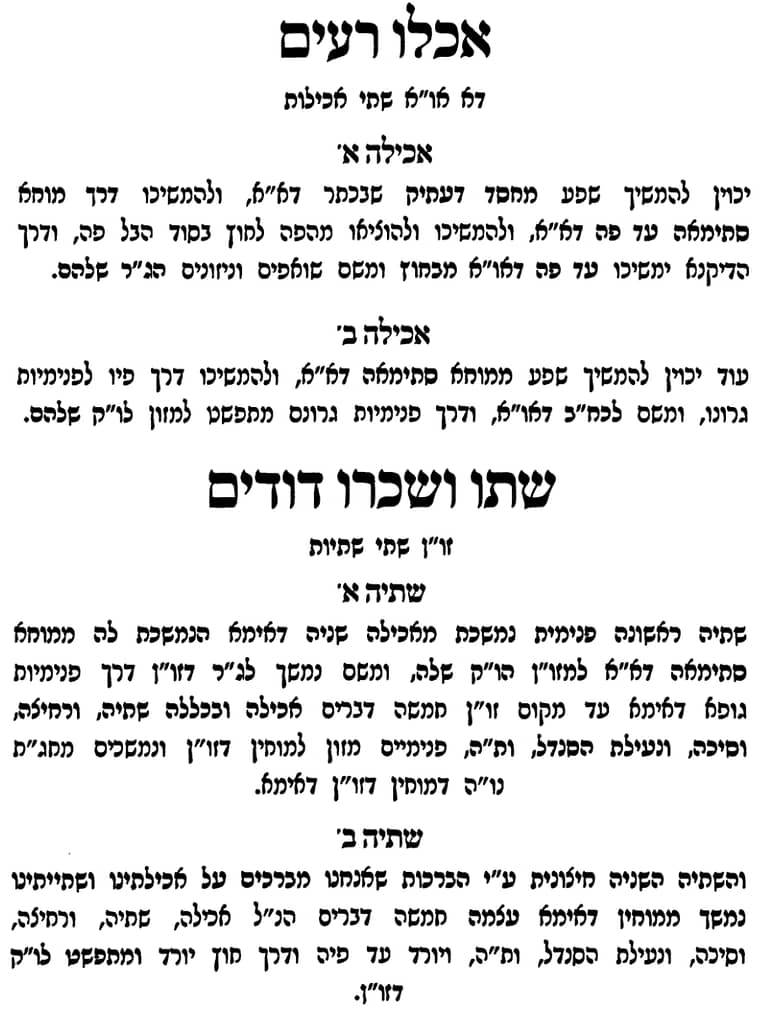
2. Sifting and elevating the sparks from the food
As mentioned before, eating is 100% part of Avodat Hashem. And, as with all Avodat Hashem, there are sparks to be sifted from the food, which need to be elevated back to their source.
This Kavanah aids in doing just that.
It’s important to note that whenever we lift up more sparks, then Mochin (divine consciousness) comes down as a result.
This is a relatively easier intention to make and uses Gematria as well:

From Sefer HaLikutim (Bereshit) we find that the Nefesh of these sparks is rectified through the food, the Ruach is rectified through studying on the table (see below) and the Neshama is rectified by being sad over the Holy Temple (see below as well).
3. Rectifying the reincarnated souls in the food
There are souls that were reincarnated in each of the 4 Kingdoms: Mineral, Plant, Animal and Human. Food is obviously either in the Mineral (as is the case of “salt”), Plant (like vegetables and fruits) or Animal Kingdom.
In Sha’ar HaGilgulim we find that if a soul is reincarnated in a Plant item, once he’s eaten by a human with the proper blessing, he becomes reincarnated in that human and is rectified. There are also certain months in which the soul jumps up a level.
There’s a fascinating story by R’ Yehuda Ptaya in his commentary on the Tanach called Beit Lechem Yehuda, in which a simple woman once ate a date after blessing “Bore Pri HaAdama”. Now, we know that this is not really the true blessing, because the correct one is “Bore Pri HaEtz“. However, that night she was visited by this illustrious old man in shiny white clothes who thanked her for it, even if her blessing was not the most correct. In eating the date she had helped the old man rectify himself.

As we know, the parts of the soul that generally need rectification are the Nefesh, Ruach and Neshama, while the Chaya and Yechida don’t need any rectification and illuminate from the outside.
4. Sustaining your own soul with the light of the food
As it turns out, when you eat food, your soul is also eating!
The physical body eats the physical part of the food while the soul eats the spiritual counterpart of food. When you make a blessing and eat with holiness, you are strengthening your own soul.
This might seem like something small, but in Sha’ar HaKedusha, Rav Chaim Vital teaches that one who wishes to become a Tzadik (his own words) should strive to make the blessings very carefully, because there’s a huge benefit to them. Simply put, a blessing takes out the tumah (spiritual impurity) from the food and then you are left over with only holiness.
Not only that, but in Sha’ar Ruach HaKodesh (“Gate of the Holy Spirit”) he wrote that the Arizal taught him that one who wishes to have Ruach HaKodesh (“Holy Spirit”) should be very careful to do all the blessings of enjoyment [like food and drinks] with great concentration, and this is “one of the most important things to do in order to attain it”!
This is amazing Mussar: here many people think they are “doing Hashem a favor” by blessing him, when in reality He’s actually trying to bestow one of the greatest gifts attainable in this world (Ruach HaKodesh) and all we need to do is bless properly!
By making a proper blessing without eating up the words, you are already on your way to purifying and elevating your soul.
5. Sweetening the Judgments
Pleasures are forms of Dinim (Judgments). As I wrote in another place, Dinim are not “bad” in themselves. They give limits to Creation so the Light of Hashem can be properly enjoyed. Rather, if left to chance, Dinim serve as sustenance and empowers evil because they are represented by the name Elo-him.
What this means is that any pleasure we partake in for our own without holiness is also feeding evil. The way to sweeten these Dinim in this case is through mindful eating, not overeating, blessing properly and through Kavanot.
Here’s a full article on the mechanism of dinim.
And this is why we have many things to sweeten the dinim such as blessings, kavanot, mayim acharonim, salt, and so on.
6. Strengthening and bringing the Holy Malkhut down to us
The table is a substitute for the stone altar from the Holy Temple, and the stone altar corresponds to Malkhut. A person needs to realize that he’s the son/daughter of the King of Kings and that he’s eating directly from His table.
Rebbe Nachman brings in Likutey Moharan that when we strengthen the Shekhina (Malkhut), we are, so to speak “giving power to Hashem. This is of course one of the great paradoxes that exist, but even according to Pshat, how can one explain the Pasuk: “תנו עוז לאלהים על ישראל גאותו” which we say every day on Hodu of Shacharit?
The answer is that Hashem “binds Himself” so to speak in such a way that we need to make our Avodah in order to “give Him strength”. Kabbalistically, the world is governed by Zeir Anpin, which is the Partzuf commonly known as the Tetragrammaton. This Partzuf is lacking the Mokhin and so, when we do our work, it receives its part, is strengthened, and things improve.
When Zeir Anpin receives its Mokhin, then the Malkhut (Shekhina) many times automatically receives it as well. This is the source for the Halacha that “only sons inherit”, because the Partzuf of Zeir Anpin inherits the Mokhin, and gives the daughter (the Shekhina) her share and sustains her.
And this is what we want in the end: the Holy Malkhut of Hashem when everything is blissful and peaceful, and it all starts at our table.
Other fascinating Chiddushim
Eating is a very serious business. Perhaps one of the most important Kavanot is to eat in order to serve Hashem. If you can add more, then great.
Many Rebbes say that eating is difficult particularly because a person tends to “relax” and just “enjoy” the food, without much thought. But the whole Malkhut of a person depends on it, and with it, a person’s Parnassah (sustenance) in general.
The Zohar (Terumah 157b) also teaches us that during the days in which we say Tachanum, a person should feel sad over the Holy Temple, after eating and before the final blessing.
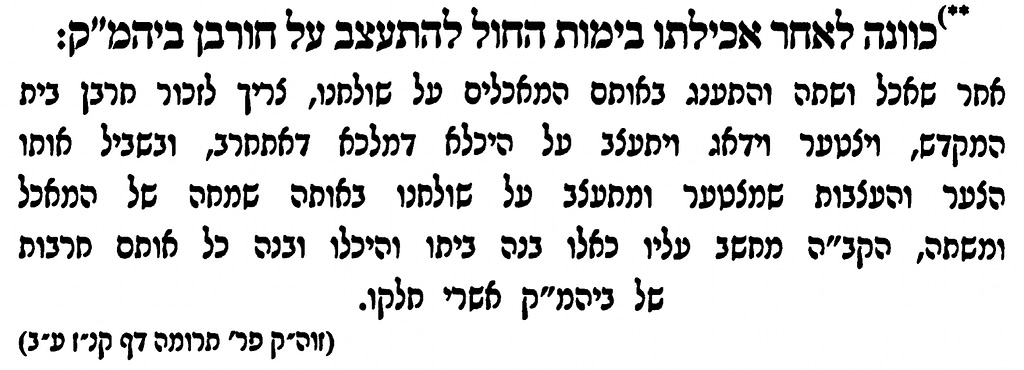
Translation: After eating, drinking and enjoying those foods (i.e. consumables) on the table, one needs to remember the destruction of the Beit HaMikdash, and be pained, worry and sadden over the Chamber of the King that was razed, and through this suffering and sadness that he suffers and saddens on his table during that happiness over food and drink, HaKadosh Baruch Hu considers as if he [that person] built His House and Chamber and rebuilt all that desolation of the Beit HaMikdash, fortunate is him [that person].
This is beyond awesome and I don’t think this needs further explanation. R’ Meir Paprish writes that this is why we usually say Psalm 137 before Birkat HaMazon, which speaks about our exile.
Remember that the final blessing is the internal part of the bracha, while the first blessing is the external part. When doing Birkat Hamazon, it’s good to say Psalm 67 in the shape of the Menorah to take out the Sitra Achra that might’ve been attracted to the table (together with Mayim Acharonim). Because, remember that food is dinim, and the Sitra Achra is attracted to that.

Conclusion
I realize this is a lot of information and is not easy.
But then again, the path to real Avodat Hashem is not supposed to be easy, otherwise we’d all be Tzadikim like Yosef HaTzadik. Eating is related to the second brit we have inside our mouths (the tongue), and is also closely associated with how a person behaves in intimate matters with his spouse.
But, as Rebbe Nachman said, there’s no despair in the world.
My advice is: start small!
Even a little bit is better than nothing and can cause great joy to Hashem. No effort by those with a sincere heart is done in vain. This much should be clear. Even a simple intention works.
Through these Kavanot, we empower the Holy Malkhut (Shekhina) so that it bestows upon us even more sustenance and make life a lot better, b’ezrat Hashem! We should also profusely thank Hashem for giving us the opportunity to serve Him even while eating!
Bon Appetit.

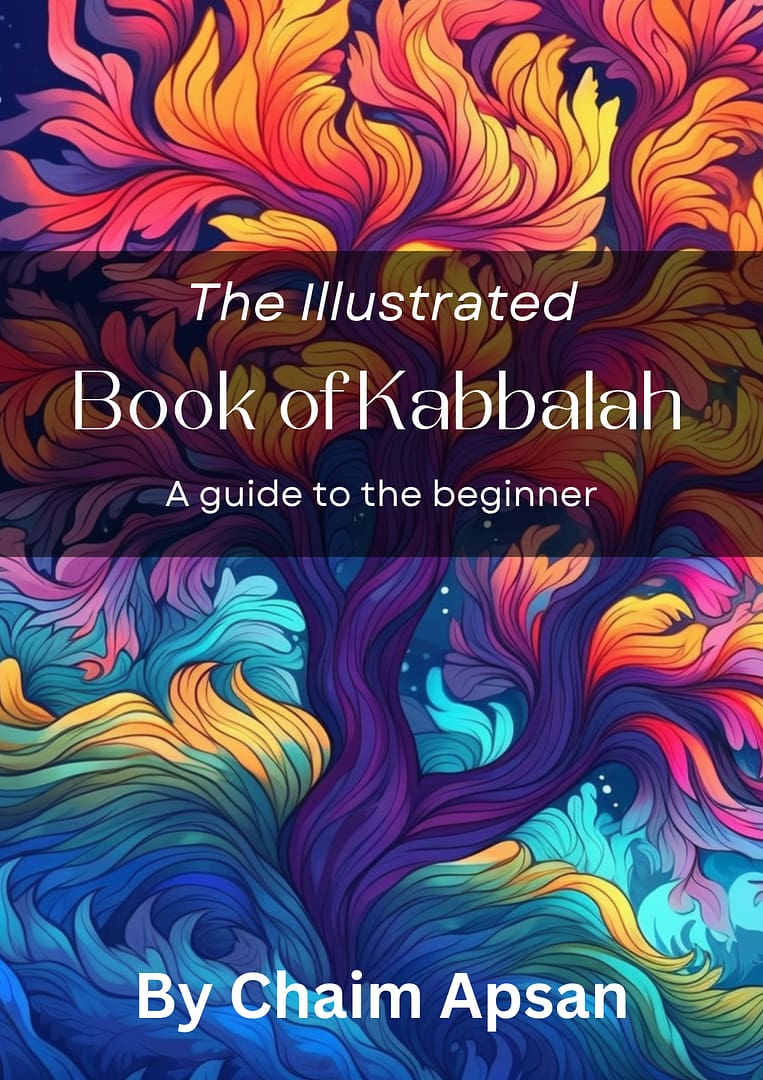









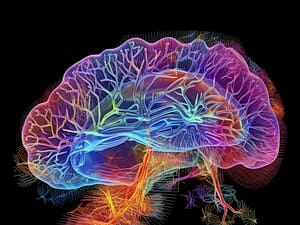

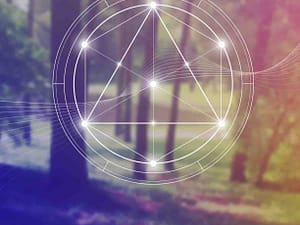
4 Responses
As a non-Jew who would like to be holy in mundane things as eating, how does this apply to a gentile? I always try to at least thank God before every meal or food in my own words.
Hi Simon, I believe you can also apply simple intention to all eating for all the aspects mentioned in the article.
Non-Jews also reincarnate and it seems to me that they too can rectify souls while at the table by intending to serve Hashem.
There’s also a way non-Jews can say a bracha for many things, even for eating and I believe it’s explained in this book: https://www.amazon.com/Divine-Code-Observing-Noahide-Revealed/dp/1733363513/
I haven’t read it myself but it has great reviews.
Where do you get your article thumbnails/images?
Is it considered that Rabbi Nachman of Breslev is as great as the ancient righteous men (Yoseph, Moshe, David, etc.), or is he still lesser than them?
And how about Rav Berland (may God give him long days and years of life in good health)? Is he on a similar ‘level’ as Rabbi Nachman?
I got my images with Midjourney AI.
The whole subject of soul levels and sources is very complex. What we mainly know is from the Kitvei Ari, which includes Shaar HaGilgulim and the lesser known Sefer HaGilgulim from the Ramah MiPano. The Arizal in particular has been 100% received by virtually all real Tzadikim of generations that followed and he had direct contact with Eliyahu HaNavi. This establishes his Mesora as authentic and true.
That said, we learn from him and the Zohar that Moshe Rabbenu was the highest soul to ever come down until Mashiach.
Regarding Rebbe Nachman it’s very difficult to say because we don’t have further (reliable) revelations as to his soul level. I do believe that he stands in a category of his own, precisely because no other Rabbi receives so much honor in his Hilula except for Rabbi Shimon Bar Yochai (Rebbe Nachman received in regular years over 60.000 Jews while Rabbi Shimon over half a million). The fact that Jews have organized themselves around these 2 personalities to celebrate their passing speaks volumes.
There’s a principle that the subsequent generations’ general level decreases with time. There are Tzadikim that are exceptions to this rule, and are much higher than many of the greatest of the previous generations, but I personally don’t think anyone can compare to Avraham, Yitzhak, Yaakov, Moshe, Aharon, Yosef and David because their souls are called “general”, and also contain all the subsequent souls.
As for Rav Berland, who should live a long life of health and strength, he once blessed us that when we get to 90 years old we should merit to reach the level Rebbe Nachman reached when he was 3 years old, so that should answer your last question. 🙂